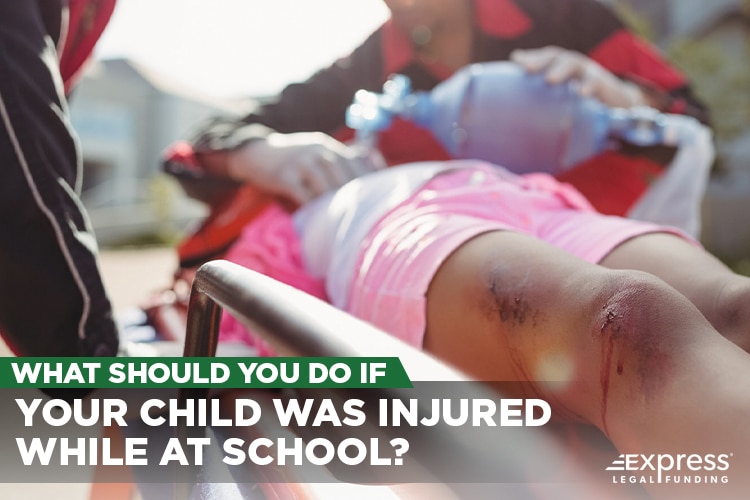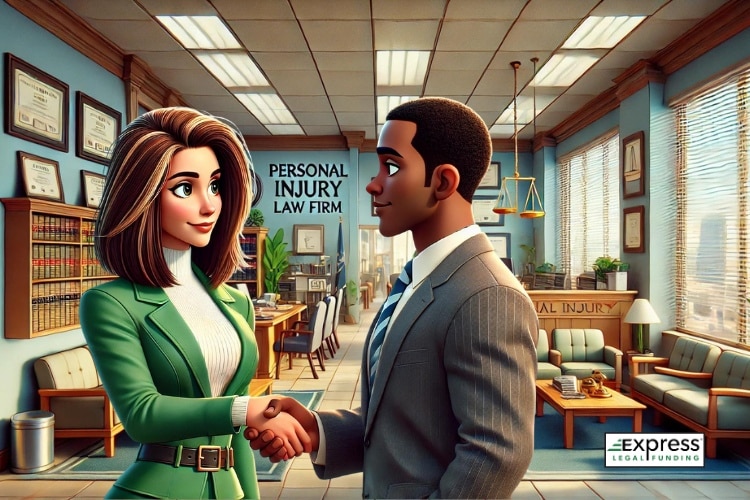Written by Aaron R. Winston
Last Updated: November 1, 2022 6:17am CDT

Children are our future. We have made a society built around protecting our children and educating them to take their roles as the next generation of leaders. However, the love and care we have for our children extend to a deeper part of the human experience. It is no wonder that we ensure they are well-taught and kept in a safe environment.
Unfortunately, children are fragile for some time, and when we cannot be with them 24/7, we entrust their care to others. While they are at school, the duty of care falls on their teachers and administrators to ensure they remain safe and healthy while the parents or guardians focus on working.
But what if they get hurt on the watch of school district staff? Learning your child has been injured can be terrifying and can leave you at a loss for what to do next. We hope to help you overcome that storm of confusion and plan your next move with this article.
Make Sure They Receive the Proper Medical Care
Sadly, children getting injured at school is becoming an all-too-common occurrence. Even more disheartening is that these injuries are not always just minor scrapes, sprains, or bruises. Sometimes children are severely injured while under the care of those watching over them on school grounds. While minor injuries necessitate a visit to the school nurse for disinfectant and a band-aid, other injuries are severe enough to warrant legitimate medical care.
Suppose your child suffers a broken limb or is given a grievous wound while on school property, the school administrator would ordinarily bring them to the nearest medical facility for treatment. If their injuries warrant this level of care, it is vital to make sure you do not avoid providing it.
Allow your child to be examined to determine the full scope of the damage and any subsequent treatment they might need. If a parent were to instruct a school not to seek out much needed urgent care, any chance of holding the school financially liable for the injuries suffered.

Depending on the injuries, your child might need x-rays, rehabilitation, and medication to recover from them. Everything from broken bones to toxin exposure on school grounds requires intervention from qualified medical staff with the proper equipment.
If you stumbled across this article during your research, then odds are your child did not simply experience a minor fall accident on the playground but suffered a severe injury.
However, only the severity of the damage is essential rather than the exact nature. At the risk of sounding somewhat callous, your child’s visit to a hospital will also be necessary for any claim you file against the school. This documentation will be critical to your case down the road.
Medical records of the injuries and treatments are potent forms of evidence when attempting to prove your claim. And if it was bad enough to require intervention by a doctor or hospital visit, you might also need to consider the legal aspect.
Determine How the Injury Happened
The most crucial step in potentially pursuing legal action revolves around the circumstances leading up to the injury. In this sense, it is not too dissimilar to a standard personal injury investigation for an injured adult. The events are important because it helps determine whether the school injury is the facility’s fault, the faculty, another student, or if it was genuinely a simple accident. This situation helps determine if and who you have the basis for filing a claim against.
While accidents do happen, if the injury could have been avoided and was allowed to occur due to negligence on the part of the school, then they can be held accountable. There are certain caveats, but there are still avenues that you can pursue. So, gathering information about the injury should be the focus of your attention once your child’s health is assured.
If your child was injured due to faulty or unsafe environments that the school knew or should have known was an issue, or if a school employee that was required to have a background check but didn’t was found to have abused them, the school would be held directly liable. This liability is generally due to the school failing to vet their staff before allowing them access to children in the latter case.
If your child was injured due to another student harming them, then the offending child’s parents will also hold responsibility. However, if the child fell off the monkey bars on the playground and broke their leg, there may be no responsibility from the school, as the child’s injuries are simply an accident. However, if the playground equipment was broken or in disrepair, the school may be liable.

There are plenty of examples of how a school could be negligent enough to leave your child wounded:
- Lack of adequate supervision improperly maintained infrastructure, causing falls.
- Food poisoning due to poorly prepared foodstuffs in the cafeteria.
- Exposure to toxins like asbestos, black mold, or lead paint.
- Injuries such as a school bus accident could be considered negligent, as your child was under the care of a school employee.
- Unsafe equipment could be negligent, such as a lack of handrails or unsafe playground equipment resulting in playground injuries.
In all of these cases, the school could be held liable if the evidence supports that they were aware of these issues and did nothing to correct them. Even the bus driver getting into a car accident can be tied back to the institution and not only the driver and school bus company.
When it comes to injuries sustained from bullying, the school’s liability is not always specific. The offending student’s parents can be held liable for not controlling their child, and the school can be held responsible for failing to take measures to prevent the harassment of your injured child in the first place.
However, the issue proves that they were aware of the harassment. If your child has repeatedly complained about the harassment, but the faculty did nothing to stop it, that can be a solid indicator of the school’s negligence.
However, regardless of how they sustained the injury, subsequent steps can be made a little more complicated depending on the nature of the school.
Is the School a Public or Private Institution?
Believe it or not, this is a significant factor in the success or failure of your claim. The way such personal injury claims are levied changes depending on whether your child attends a public or private school. You need to be aware of these procedures if you want your claim to make it into the system at all, much less succeed.
Claims against government agencies and facilities are always a little tricky since they have specialized legal protections. Among those protections is something called “sovereign immunity” which protects municipal agencies like public schools from having lawsuits filed against them at all. For public schools, the big conditional is that it is a government institution.
However, this does not mean that you cannot hold the school accountable for negligence leading to your child’s injury. Sovereign immunity can be waived in all states if staff is proven negligent or directly involved in the injury. However, even with the sovereign immunity issue alleviated, you still need to conform to your local state law and local ordinances.

When filing against a government institution, the procedure is outlined on a state-by-state basis rather than a federal one. For example, you are required to file a notice of claim before you can move forward. The notice serves to inform them of your intent to file a lawsuit against them so that they can make preparations. The exact process for filing such notice and the deadline can vary by state, meaning you will need to study up on your state’s specific laws before you can file. However, there are a few universal factors you will likely see:
- You will be informing them of your intent to request compensation for your child’s injuries.
- You might be outlining the circumstances of the negligence or abuse that led to the injuries.
- You will have to provide your full legal name, address, and other pertinent information.
- You might need to describe the injuries your child sustained.
As for deadlines, they can vary by city, state, and jurisdiction. However, all of this is assuming that your child’s school is a public school (and not a private one).
Private schools are different since they do not have any government backing. As a result, there are rarely any special procedures involved in simply filing a claim against them for negligence or abuse. Instead, you merely need to go through the civil court system as you would for any lawsuit. The same applies if a bully caused the injuries and you want to hold the offending child’s parents accountable as well.
Gather Evidence to Support Your Claim
It is unreasonable to expect your claim to go uncontested. No one wants to be held responsible for a child being injured on their watch, so finding materials to help corroborate your claim is essential to a successful process. Unfortunately, this information can be challenging to acquire in some circumstances, and a lot of it might even be gathered by law enforcement rather than you or your attorney.
However, this does not mean there is no evidence to gather yourself. For example, the medical records from your child’s treatment following the injury can serve not only to outline the extent of your child’s pain and suffering but the types of injuries that will help to reinforce your story further.

Additionally, we live in a time when practically every student in the country is walking around with portable cameras that they love to use. If any of your child’s classmates recorded the incident, getting a copy of the footage to use in the discovery would help to make your case stronger. Most schools even have security cameras installed whose footage can be requested for review to support the claim.
Evidence is the most significant force in the legal world, so the more you have, the higher your chances of success. This information will be invaluable to the law firm that you choose to partner with.
You Might Need Legal Counsel
While we are not saying you need to seek a personal injury attorney, it might be worth considering, depending on your circumstances. Solely because filing a claim against an institution can be extremely complicated, more so for government institutions like public schools, and beyond the scope of those untrained in legal discourse.
Retaining the services of a personal injury lawyer for personalized legal advice can simplify the procedures that follow and help reinforce your case.

They will also handle filing the notice and the personal injury lawsuit itself on your behalf, which will allow you to focus more on tending to your child. Again, we do not presume to tell you that you should hire or retain an attorney’s services. We only feel that letting you know the option exists is fundamental to the basis of this article and personal injury cases.
Closing Statements
There is little in the world that is more horrific than your child being injured. It is our instinct to protect them from any harm that might come their way, and leaving them in the care of others to do the same is always terrifying for parents and caregivers.
When those who have a duty of care fail to do so, it is reasonable to want to see justice wrought. While filing a claim will not undo what your child went through, it can help to illuminate the negligence of those who allowed it to happen. In and of itself, this conclusion can be a relief for some parents.

However, fighting a legal battle following an accident is never easy on your mind or finances. Even though you do not have to pay your lawyer until after the case is settled or won, the cost of your child’s medical treatment and the everyday cost of living can severely drain your finances.
We at Express Legal Funding understand the strain of such a financial burden, and we want to help where we can. Our legal funding service is designed to provide an advanced sum of money on a pending legal claim. The funds can be used to pay for essentials like groceries, rent, and medical bills while you and your child’s lawyer focus on helping your child heal during their injury lawsuit.
You can contact us anytime for a free consultation to learn more about pre-settlement funding and to see how we can help you. It’s important to note that Express Legal Funding does not provide its financial services to minors; however, we can provide funding on any of the parental portions of the claim.
About the Author
Aaron Winston is the Strategy Director of Express Legal Funding. As "The Legal Funding Expert," Aaron has more than ten years of experience in the consumer finance industry. Most of which was as a consultant to a top financial advisory firm, managing 400+ million USD in client wealth. He is recognized as an expert author and researcher across multiple SEO industries.
Aaron Winston earned his title "The Legal Funding Expert" through authoritative articles and blog posts about legal funding. He specializes in expert content writing for pre-settlement funding and law firm blogs.
Each month, tens of thousands of web visitors read his articles and posts. Aaron's thoroughly researched guides are among the most-read lawsuit funding articles over the past year.
As Strategy Director of Express Legal Funding, Aaron has devoted thousands of hours to advocating for the consumer. His "it factor" is that he is a tireless and inventive thought leader who has made great strides by conveying his legal knowledge and diverse expertise to the public. More clients and lawyers understand the facts about pre-settlement funding because of Aaron's legal and financial service SEO mastery.
Aaron Winston is the author of A Word For The Wise. A Warning For The Stupid. Canons of Conduct, which is a book in poetry format. It consists of 35 unique canons. The book was published in 2023.
He keeps an academic approach to business that improves the consumer's well-being. In early 2022, Aaron gained the Search Engine Optimization and the Google Ads LinkedIn skills assessment badges. He placed in the top 5% of those who took the SEO skills test assessment.
Aaron's company slogans and lawsuit funding company name are registered trademarks of the United States Patent and Trademark Office. He has gained positive notoriety via interviews and case studies, which are a byproduct of his successes. Aaron R. Winston was featured in a smith.ai interview (2021) and a company growth case study (2022).
In 2023, Aaron and Express Legal Funding received accolades in a leading SEO author case study performed by the leading professionals at WordLift. The in-depth data presented in the pre-settlement funding SEO case study demonstrate why Aaron Winston maintains a high-author E-E-A-T. His original writing and helpful content continue to achieve unprecedented success and stand in their own class.
Aaron was born in Lubbock, TX, where he spent the first eight years of his life. Aaron attended Akiba Academy of Dallas, TX.






